MasterChef Junior Classes: Culinary Education for Kids
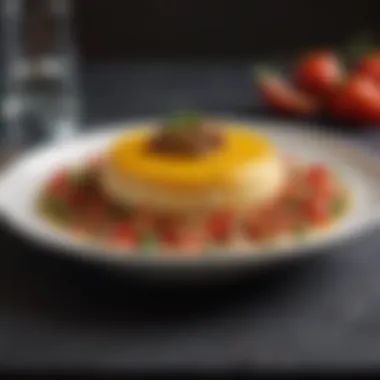
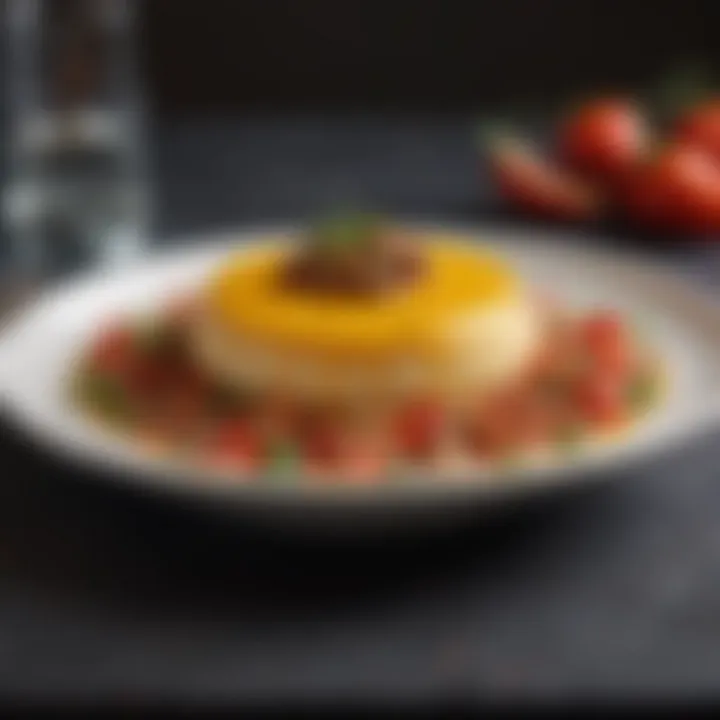
Intro
Culinary education for children is gaining significant traction, particularly through initiatives like MasterChef Junior classes. These programs represent a unique blend of education and engagement aimed at nurturing the passion for cooking in young chefs. Highlighting the importance of such classes unveils how they foster essential skills that go beyond mere cooking. They provide a foundation for creativity, collaboration, and self-confidence, laying the groundwork for future culinary pursuits.
Furthermore, this exploration focuses on the curriculum structure, benefits, and the overall impact on participants. By weaving insights from instructors and young chefs, we aim to offer a well-rounded perspective on what these classes can provide in terms of culinary education.
Overview of MasterChef Junior Classes
MasterChef Junior classes are designed specifically for children who have an interest in cooking. They provide a framework for budding chefs to learn in a structured yet fun environment.
Key Components of the Classes
- Curriculum: Each class typically covers a variety of techniques and recipes that build culinary skills.
- Instructors: Participants learn from experienced chefs who guide them through each lesson.
- Hands-On Experience: Classes focus on practical cooking, allowing children to apply what they learn immediately.
- Collaborative Environment: Young chefs often work in teams, promoting teamwork and peer-learning.
This systematic approach not only enriches their cooking skills but also instills a sense of responsibility and teamwork among participants.
Benefits of MasterChef Junior Classes
The advantages of enrolling in these classes extend well beyond the kitchen.
- Skill Development: Young chefs acquire vital cooking skills that serve as the foundation for future culinary endeavors.
- Confidence Building: Gaining new skills fosters a sense of confidence in children, empowering them to enjoy cooking at home.
- Creativity: These classes encourage experimentation with flavors, leading to a more creative culinary expression.
- Social Skills: Working with peers helps participants develop interpersonal skills and enhance their capacity to collaborate.
"Culinary education at an early age cultivates not just chefs, but well-rounded individuals with a unique skill set."
These benefits can have lasting effects, shaping a child's attitude towards food and cooking for years to come.
Closure
In short, MasterChef Junior classes offer a profound opportunity for young aspiring chefs. Through structured learning, hands-on experience, and collaborative efforts, they gain more than just culinary skills. They develop creativity and confidence that can lead to a lifelong appreciation for cooking. \n As we dive deeper into the structure and experiences these classes offer, the significance of investing in culinary education for children becomes unmistakably clear.
MasterChef Junior represents not just a cooking class; it’s a stepping stone towards possible culinary careers and a richer understanding of the culinary arts.
Prolusion to MasterChef Junior Classes
MasterChef Junior classes represent a vital intersection of culinary education and youthful enthusiasm. This article aims to explore this unique landscape, shedding light on why such programs are essential for young aspiring chefs. The focus is not simply on cooking; it encompasses a broad spectrum of skills that can significantly impact a child's development.
Defining MasterChef Junior
MasterChef Junior is a competitive cooking show that showcases the talents of young chefs, typically between the ages of 8 and 13. The show serves as a launchpad for many children, igniting their passion for culinary arts. More than just a television program, MasterChef Junior encompasses a network of classes designed to impart culinary techniques and essential life skills. These classes are structured to be both educational and enjoyable, creating an engaging atmosphere for learning. They concentrate on various aspects of cooking, from fundamental skills to advanced techniques.
One key element of MasterChef Junior is its emphasis on creativity. Children are encouraged to express themselves through cooking, which can enhance self-confidence and innovation. The programs often reflect the spirit of the show, aiming to inspire a new generation of culinary enthusiasts.
The Evolution of Culinary Education for Kids
Over the years, culinary education for children has undergone significant transformation. Initially, cooking was often seen as a domestic skill taught at home. With shows like MasterChef Junior gaining popularity, education in this area has shifted towards a more structured and formal approach. Today, many culinary schools and community centers recognize the importance of teaching cooking to children, offering specialized programs that cater to different age groups.
Many factors have contributed to this evolution. Health concerns regarding nutrition and dietary habits are prominent in today's society. Parents are more aware of the importance of teaching children about food preparation and nutrition. Additionally, the culinary world itself has expanded, including diverse cuisines and cooking techniques, further enriching the learning experience. Kids now have access to resources that were not available in the past, such as online videos and social media platforms, which encourage them to explore cooking in their own time.
With the growing popularity of cooking shows and the increasing visibility of culinary arts as a profession, many young people now aspire to become chefs. MasterChef Junior classes play a crucial role in this shift, providing a supportive environment to explore these desires. As these programs continue to grow, they foster not just new culinary skills but also a comprehensive understanding of the culinary world, equipping the next generation with tools for success.
Curriculum Overview
The curriculum encompasses the foundational elements of culinary education within MasterChef Junior classes. This structured educational plan helps children develop various essential skills necessary for cooking. Understanding this curriculum is paramount, as it showcases the values and goals behind these classes, which aim not only to teach young chefs to cook but also to instill a sense of confidence and creativity in the kitchen.
MasterChef Junior classes emphasize a well-rounded approach to culinary education. The curriculum includes hands-on experience, theory behind cooking, and opportunities for creative expression. Each aspect of the curriculum is designed to build upon the last, ensuring that students gain a comprehensive understanding of cooking from multiple angles.
Core Culinary Skills
Core culinary skills serve as the foundation for any aspiring young chef. These skills include knife safety, proper cooking techniques, and understanding basic cooking terminology. MasterChef Junior classes teach these skills from the ground up, ensuring that participants understand not just how to execute a task, but why each method is important.
Students may learn to chop vegetables correctly or apply various cooking methods such as boiling, roasting, and sautéing. The training in these essential skills builds not only practical capabilities but also encourages discipline and respect for the cooking process.
Creative Cooking Techniques
Culinary education at this level goes beyond fundamental skills. Creative cooking techniques are an important part of the curriculum, enabling young chefs to explore their imagination while cooking. Students are encouraged to experiment with flavors, textures, and presentation. This exploration leads to personal expression and fosters a confidence in the kitchen.
Innovative techniques may include deconstructing familiar dishes, incorporating diverse ingredients, and inspiring plating styles. Such methods empower children to think critically and creatively about food, turning cooking from a mere task into an art form.
Understanding Nutrition
An understanding of nutrition is increasingly relevant in today's culinary discussions. MasterChef Junior classes address health and diet as an integral part of their curriculum. Young chefs learn about the importance of balanced meals, ingredient sourcing, and the impact food choices have on well-being.
This aspect of the curriculum might include lessons on vitamins, minerals, and the nutritional value of various foods. By fostering a connection between cooking and health, students emerge not only with cooking skills but also with a conscious awareness of the food they prepare and consume.
Teaching Methods
Teaching methods in MasterChef Junior classes are critical to shaping the culinary education experience for young chefs. The approaches adopted focus on practical engagement, collaborative dynamics, and the encouragement of personal creativity. Each element plays a significant role in nurturing essential cooking skills while also fostering a positive learning environment.
Hands-On Experience
Hands-on experience is a cornerstone of the MasterChef Junior curriculum. This method allows young chefs to actively participate in cooking activities instead of only watching demonstrations. Engagement with ingredients and tools helps solidify their understanding of culinary techniques.
The benefits of hands-on learning include:
- Skill Development: Young chefs gain practical skills by chopping, mixing, and plating meals. This real-life application translates theoretical knowledge into practice.
- Immediate Feedback: Instructors can provide real-time guidance, allowing students to adjust their techniques on the spot. This feedback loop is valuable in accelerating the learning process.
- Confidence Building: Successfully completing a dish enhances self-esteem as young chefs see their efforts materialize into something delicious.
Collaborative Learning
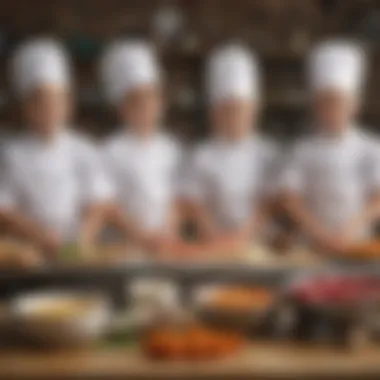

Collaboration is integral for MasterChef Junior classes. Working together on cooking tasks helps participants learn teamwork and communication skills. By sharing responsibilities, young chefs understand the importance of combining individual strengths to achieve a common goal.
The advantages of collaborative learning include:
- Social Skills Enhancement: Children develop essential communication and interpersonal skills, which are vital both in and outside the kitchen.
- Problem Solving: Group cooking often introduces challenges. Collaborating enables participants to brainstorm solutions, strengthening their problem-solving abilities.
- Respect for Diversity: Exposure to different cooking styles and perspectives fosters an appreciation for diverse culinary cultures.
Encouraging Individual Expression
Encouraging individual expression is key in cultivating creativity within young chefs. While foundational skills are essential, allowing children to experiment and put their twist on certain recipes can lead to personal growth and satisfaction.
This aspect of teaching offers several benefits:
- Creativity Cultivation: Children learn to think outside the box, trying unique combinations of flavors or presentation styles, fostering innovation in their culinary approach.
- Personal Ownership: When young chefs feel ownership over their creations, their enthusiasm for cooking typically increases, leading to a lasting passion for the culinary arts.
- Resilience and Adaptability: Allowing room for experimentation teaches young chefs that mistakes are a part of learning. They become more comfortable adjusting their recipes and techniques according to outcomes.
"The MasterChef Junior classes focus on hands-on experience, encouraging children to learn through direct engagement with cooking. This method is essential for building foundational skills while fostering creativity."
Teaching methods such as hands-on experience, collaborative learning, and encouraging individual expression create a well-rounded educational environment. These approaches significantly contribute to developing young chefs into competent and creative culinary enthusiasts.
Benefits of MasterChef Junior Classes
The benefits of MasterChef Junior classes extend far beyond simple cooking techniques. These classes are designed to shape the future of young chefs by providing a structured environment that fosters a diverse set of competencies. Participants not only learn about food and cooking but also absorb valuable life skills that contribute to their overall development. In understanding these benefits, one can appreciate the transformative potential of culinary education for kids.
Building Confidence in Cooking
Confidence is a crucial factor when it comes to culinary endeavors. MasterChef Junior classes help to build this confidence among young chefs. Through a gradually intensifying curriculum, participants encounter various cooking challenges that require creativity and technical skills. Each completed dish, no matter how simple, reinforces their abilities. Over time, they learn to believe in their skills, leading to a willingness to experiment. This confidence is not limited to culinary arts; it spills over into other areas of life, encouraging children to take on new challenges outside the kitchen as well.
Enhancing Problem-Solving Skills
Another significant advantage of these classes is the enhancement of problem-solving skills. Cooking is often unpredictable. Maybe an ingredient substitutes, or perhaps something does not turn out as planned. MasterChef Junior classes provide a safe and supportive space for students to learn how to approach such challenges. They develop critical thinking as they analyze problems and identify alternative solutions. For instance, if a souffle does not rise, young chefs learn to troubleshoot by researching causes and trying different techniques. This capability will serve them well in various aspects of life, reinforcing resilience and adaptability.
Fostering Teamwork and Communication
Furthermore, culinary education through MasterChef Junior promotes teamwork and communication skills. Many classes encourage collaborative projects where students must work closely with peers. As they navigate kitchen tasks together, young chefs learn to communicate effectively, share responsibilities, and resolve conflicts. This collaboration is vital in today's world, where interpersonal skills are as crucial as technical expertise. The kitchen becomes a platform for social interaction, teaching respect for others' ideas and the importance of contributing to a shared goal.
Engaging in a supportive culinary environment, young chefs not only learn the art of cooking but also essential life skills, fostering their future as capable individuals.
In summary, the benefits of MasterChef Junior classes contribute significantly to the personal and professional development of young participants. Building confidence, enhancing problem-solving abilities, and fostering teamwork create a holistic learning experience that transcends the kitchen. Such skills are fundamental for any aspiring chef and can serve as building blocks for success in a myriad of future endeavors.
The Role of Instructors
In MasterChef Junior classes, instructors play a pivotal role in shaping the experiences and skills of young chefs. They are not just educators, but mentors who inspire and cultivate a love for cooking in children. Their influence can significantly affect how children engage with culinary arts. With the right guidance, young pupils learn valuable skills that can last a lifetime.
Qualifications and Expertise
Instructors typically possess a robust culinary background. Many have degrees in culinary arts or related fields. Experience in professional kitchens adds to their credentials. This combination equips them with the technical knowledge needed to teach complex cooking techniques. Understanding various cuisines enhances their ability to expose children to a diverse range of flavors and cooking styles.
Many instructors also have experience working with children. This experience is crucial. It enables them to communicate effectively with young minds. They understand child development and how to tailor lessons accordingly. Moreover, instructors must be patient as they guide children through challenges in the kitchen. Special training in child nutrition can also be beneficial, as it allows instructors to impart essential information about healthy eating.
Mentorship and Guidance
Mentorship is another vital aspect of the instructor's role. A great mentor can motivate and drive a child’s passion for cooking. Instructors often focus on creating a supportive atmosphere where young chefs can explore their culinary abilities without fear of failure. They encourage experimentation, teaching children that making mistakes is part of the learning process.
"The best chefs are not those who never fail, but those who learn from their failures," a common saying among culinary educators.
Instructors provide personalized guidance that addresses each child's unique strengths and weaknesses. They foster creativity by offering positive feedback and constructive criticism. This delicate balance can enhance the children's confidence and fuel their desire to improve.
Additionally, instructors often share their own personal stories and journeys in the culinary world. These anecdotes can inspire young chefs to pursue their dreams. Understanding the real-life applications of culinary skills helps solidify a child’s commitment to their cooking education. By engaging with their mentors, children often feel empowered, which can lead to greater success in their culinary pursuits.
Experiences from Participants
Experiences from participants in MasterChef Junior classes provide invaluable insights into the effectiveness and impact of these culinary programs. As young chefs delve into the world of cooking, they share their personal journeys, highlighting both the successes and challenges they face. Such testimonies enhance the understanding of how these classes nurture skills and foster a love for the culinary arts.
Success Stories
Success stories from MasterChef Junior participants are often inspiring. Many young chefs talk about how the classes have transformed their culinary abilities. For instance, a participant might share how they gained the confidence to prepare complex dishes, such as homemade ravioli or delicate soufflés. These achievements often stem from a supportive learning environment where they felt encouraged to experiment and make mistakes.
A notable success story includes a child who had previously struggled with self-esteem. After participating in MasterChef Junior, they not only improved their cooking skills but also found a new sense of identity. Engaging with peers who share similar interests created bonds that fostered teamwork, turning cooking into a collaborative effort.
In addition to personal growth, success stories often include competitive achievements. Many participants have gone on to showcase their skills in local cooking contests or family events. The skills acquired in the classes helped them stand out, illustrating how MasterChef Junior acts as a springboard for young talent.
Challenges and Triumphs
While success is a common theme in testimonials, challenges are equally important to address. Participants often encounter difficulties, such as time management and the pressure of meeting high expectations. These obstacles can be daunting, especially for those who are passionate about cooking but are still learning the basics.
Furthermore, some young chefs may find it challenging to accept criticism constructively. Learning to navigate feedback from instructors or peers is a crucial part of their growth. However, participants who overcome these challenges often report significant personal development. They learn resilience and the importance of embracing failures as stepping stones to success.
Overall, the combination of successes and challenges contributes to the holistic development of young chefs in MasterChef Junior classes. By reflecting on their experiences, participants not only celebrate their culinary journey but also acknowledge the valuable lessons learned along the way, making the culinary arts a path of continuous learning and self-discovery.
The Impact of MasterChef Junior on Future Careers
The significance of MasterChef Junior classes extends beyond mere cooking. For many aspiring young chefs, these programs lay the groundwork for potential culinary careers. The lessons learned and skills acquired during these formative experiences can have lasting effects on their professional journeys. A structured culinary education at an early age helps sharpen various competencies that are crucial in today's fast-paced job market.
MasterChef Junior creates a pathway that can guide children toward a multitude of career possibilities within and outside culinary arts. When children engage in these classes, they start to understand the essentials of food preparation, presentation, and creativity. This hands-on experience is invaluable, providing a real-life context for the technical skills learned.
"MasterChef Junior classes are not just about cooking; they are about preparing young minds for diverse career paths in the culinary world and beyond."
Culinary Careers
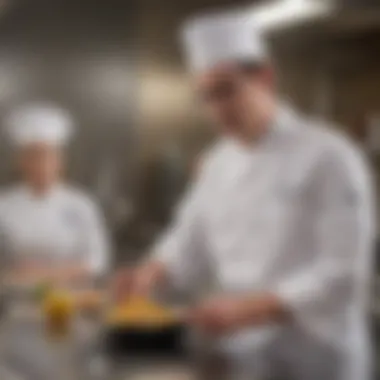
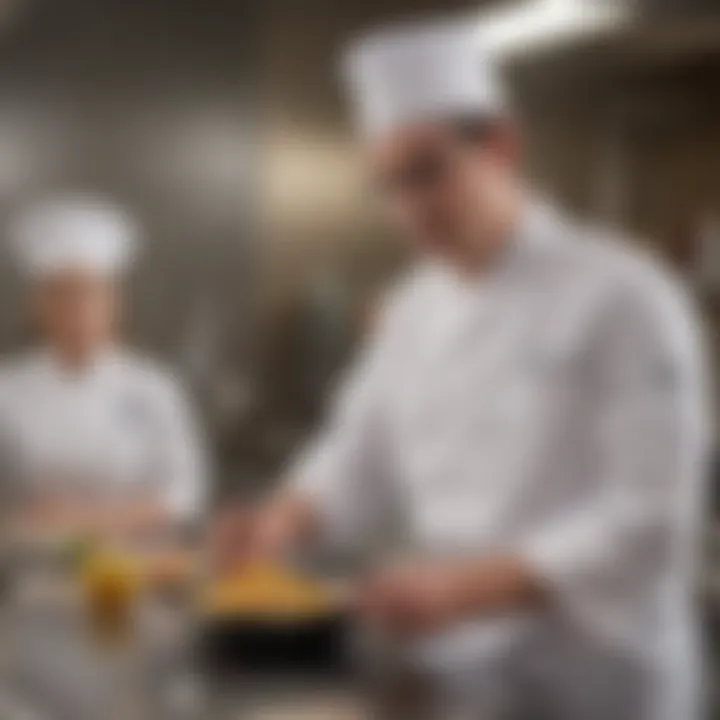
Culinary careers are perhaps the most direct outcome of participating in MasterChef Junior. The program instills fundamental skills like knife techniques, cooking methods, and flavor profiles. Many successful chefs began their journey at an early age, driven by a passion for cooking nurtured in environments like MasterChef Junior.
The classes expose participants to various aspects of the culinary field. Young chefs might discover interests in specialized areas such as baking, pastry arts, or even nutrition. They can develop a thorough understanding of kitchen operations, which can benefit future endeavors as chefs, kitchen managers, or culinary educators. The experience within the MasterChef framework can also open doors to internships or apprenticeships in professional kitchens, offering critical real-world exposure.
Other Career Paths Influenced by Culinary Skills
The skills gained from MasterChef Junior do not only cater to culinary careers. Many of the abilities developed in the kitchen are transferrable to other professional paths.
- Event Planning: Knowledge about food presentation and menu creation can contribute to event planning and catering services. Young chefs understand what makes a dish appealing, which is crucial in these roles.
- Marketing and Food Writing: With a solid grasp of culinary techniques, participants can pursue careers in food journalism, blogging, or marketing. They can leverage their knowledge to create engaging content that resonates with food enthusiasts.
- Nutrition and Health Education: A background in cooking lays the foundation for careers in nutrition. Young chefs often develop an interest in healthy eating, which can lead to roles in dietary planning or public health education.
- Business Management: Those interested in opening their own restaurants can benefit from the entrepreneurial skills acquired through managing kitchen dynamics and understanding customer service.
Online vs. In-Person Classes
The advent of technology has transformed numerous fields, including culinary education. When discussing MasterChef Junior classes, it is crucial to consider both online and in-person formats. Each mode of learning brings unique advantages and challenges. Regardless of the format, the focus remains on nurturing young chefs and enhancing their cooking skills. Understanding these differences can help parents and participants make informed decisions about their culinary education.
Advantages of Online Learning
Online classes offer several significant benefits that appeal to young learners and their families. One notable aspect is flexibility. Students can engage in lessons at their own pace and at times that suit their schedules. This is particularly important for children with other commitments, such as school or extracurricular activities.
- Access to Diverse Instructors: Online platforms often connect students to chefs from various regions and countries. Exposure to different culinary styles is invaluable. Young cooks can learn techniques that may not be readily available in their local classes.
- Cost-Effectiveness: Online education typically comes at a lower price point compared to in-person classes. There are no travel expenses or extra costs associated with physical facilities.
- Comfort of Home: For many children, learning in a familiar environment reduces anxiety. It allows them to focus on their culinary experiments without feeling intimidated.
Online classes can create an engaging environment where young chefs can collaborate and share ideas, enhancing their overall learning experience.
Benefits of Physical Interaction
While online classes have many advantages, in-person learning offers key benefits that are hard to replicate through a screen. Physical interaction can build stronger relationships between instructors and students. This connection often fosters a better learning atmosphere.
- Hands-On Guidance: Cooks can learn directly from instructors through live demonstrations. This immediate feedback can significantly enhance skill acquisition.
- Community and Teamwork: In-person classes build camaraderie among participants. This sense of community encourages teamwork as young chefs collaborate on culinary tasks together.
- Sensory Experience: Cooking is a tactile and sensory activity. The ability to smell, taste, and feel ingredients in a classroom setting is crucial to culinary learning.
In summary, choosing between online and in-person classes will depend on individual circumstances. Each format contributes to the development of young culinary enthusiasts in its own way. It is important to evaluate what best fits the needs and goals of the young chef.
Parent Involvement in Culinary Education
Culinary education is not solely the realm of teachers and young chefs. It thrives greatly on the participation of parents, whose roles can significantly enrich the learning environment. The involvement of parents in culinary education fosters a supportive atmosphere at home and encourages their children to explore their interest in cooking more seriously. This support not only nurtures a child's culinary skills but also builds confidence, critical thinking, and independence.
Supporting Young Chefs at Home
Parents can play a pivotal role in supporting their children's culinary endeavors. Simple gestures can make a substantial difference. Firstly, creating an inviting kitchen environment encourages experimentation. Whether it is through allowing kids to choose a recipe to make or simply giving them the freedom to explore different ingredients, this engagement helps build enthusiasm.
In addition to that, parents can assist by providing resources. Books about cooking, access to online cooking classes, or even subscribing to culinary magazines can broaden a child’s understanding of food. Parents should participate by cooking together, which can enhance both learning and bonding. This shared experience not only teaches techniques but also imparts valuable life lessons about teamwork and patience.
Moreover, parents should encourage a focus on health and nutrition. Discussing the nutritional values of different foods while cooking can instill lifelong healthy eating habits. Parents can teach kids how to read food labels and understand meal planning, making them more aware of what they are consuming.
Communicating with Instructors
An active line of communication between parents and instructors is essential. It allows parents to stay informed about their child's progress and any specific challenges they may face. Regular updates from instructors can provide insights into curriculum expectations, thus empowering parents to reinforce their child's learning at home.
Additionally, sharing experiences or concerns with instructors opens avenues for tailored support. For instance, if a child struggles with a particular skill or concept, instructors can provide specialized guidance and resources to address those difficulties. This partnership strengthens the child's overall experience in culinary classes.
Moreover, parents should not hesitate to seek feedback from instructors about their child's strengths and areas for improvement. Constructive feedback can lead to focused efforts on specific skills, which is especially beneficial for young chefs eager to improve.
Together, parent involvement in culinary education forms a foundation that not only enhances cooking skills but also fosters a seamless relationship between home learning and classroom activities. This holistic approach benefits children, preparing them for future culinary aspirations while instilling a deeper appreciation for the art of cooking.
"Parent involvement is a critical component in the culinary education of young chefs. It bridges the gap between classroom learning and practical application at home."
Through open communication and active support, parents can significantly contribute to their young chefs’ journey, ensuring both skill development and a passion for food.
Challenges Faced by Young Chefs
Culinary education for young chefs is not without its hurdles. Engaging in MasterChef Junior classes introduces children to a world of flavors and skills, but they also encounter several challenges that can shape their journey. Understanding these challenges is vital for both instructors and parents, as it can guide how best to support young chefs throughout their culinary learning.
Time Management
Time management is a crucial challenge faced by young chefs in cooking classes. Young participants often juggle multiple responsibilities, including schoolwork, extracurricular activities, and family commitments. These competing demands can lead to stress or frustration when trying to perfect a dish or complete a cooking assignment on time.
In a culinary class, timing is essential. Recipes typically involve several steps, each requiring its own time allocation. Young chefs must learn to prioritize tasks while maintaining quality. They often need to coordinate various elements, like preparing ingredients, cooking, and plating, all while keeping an eye on the clock.
Here are some strategies that instructors can introduce to assist young chefs in managing their time effectively:
- Planning: Encourage chefs to read through recipes thoroughly before cooking. This allows them to grasp the sequence and estimate the time required.
- Setting Timers: Using timers can help kids focus on individual tasks without losing track of time.
- Practice: Regular practice in managing cooking times can build confidence. The more they cook, the better they will get at estimating time.
Building Resilience through Mistakes
Mistakes are an inevitable part of the learning process, especially in culinary education. Young chefs often face setbacks in their culinary endeavors, whether it’s a burnt dish, a failed recipe, or an ingredient that doesn’t turn out as expected. These experiences can be disheartening. However, building resilience is one of the most valuable lessons young chefs can learn.
Emphasizing a positive approach to mistakes can help cultivate resilience. Instructors should encourage children to view errors as opportunities for growth rather than as failures. Here are some points to consider:
- Reflecting on Errors: After a cooking session, discussing what went wrong can help young chefs gain insight. Reflection makes them better prepared for future challenges.
- Encouraging Experimentation: Allowing children to try new techniques or adapt recipes fosters a sense of adventure. Even if the attempt fails, the experience can teach them something valuable.
- Celebrating Small Wins: Recognizing progress, even in minor areas, boosts a young chef's morale. Acknowledgment can be in the form of praise or awards within the class setting.
"Mistakes are proof you are trying." – Anonymous
This philosophy should echo throughout the curriculum. When young chefs learn to embrace their failures, they become more confident and more likely to persist in the kitchen.
In summary, young chefs face challenges in time management and resilience-building. By addressing these factors in a supportive environment, MasterChef Junior classes can cultivate not only culinary skills but also personal growth, equipping children with valuable life lessons.
Culinary Trends in Children's Cooking
The culinary landscape is always shifting. For children, this shift is particularly relevant. MasterChef Junior classes embrace these trends to shape the cooking habits of young chefs. Understanding current trends can enhance a child's culinary experience and education. This section will examine two critical elements: health and wellness focus, and global cuisine exploration. Together, these aspects prepare children for the modern culinary world.


Health and Wellness Focus
Today, there is a growing awareness around health and wellness. Young chefs are becoming more conscious of the food they eat and its impact on their health. MasterChef Junior classes are integrating this focus into their curriculum. The idea is simple: educate children about nutritious ingredients and balanced meals.
Kids learn about whole foods, fruits, vegetables, lean proteins, and whole grains. Understanding these components teaches them the value of a balanced diet. Furthermore, lessons often include tips on reducing sugar and salt intake, showcasing healthier cooking methods like grilling or steaming.
Incorporating nutrition into cooking classes has multiple benefits. It shapes lifelong habits. Children who cook healthily are more likely to continue those practices into adulthood. The lessons learned in these classes can influence choices outside the kitchen, encouraging informed eating decisions at home and at school.
"Healthy eating is not just a trend; it's a way to empower our future generations."
Global Cuisine Exploration
Culinary diversity enriches the culinary experience. MasterChef Junior classes encourage pupils to explore global cuisines. Young chefs learn about different cultures through food. This exploration fosters an appreciation for diverse flavors and traditions.
Classes may feature recipes from Italian pasta to Thai curries, each bringing unique ingredients and techniques. Through this variety, children expand their palate and gain comfort in tackling new dishes. This approach enriches their understanding of food's role globally while fostering creativity in the kitchen.
Exploring international cuisines also cultivates a broader perspective on life and society. Children begin to associate food with cultural significance. They learn that each dish tells a story, providing education beyond simple cooking skills.
In summary, culinary trends focus greatly on health and wellness, balanced with a rich global exploration. MasterChef Junior classes adeptly harness these trends, equipping young chefs with the necessary knowledge and skills for a healthier and more diverse culinary experience.
MasterChef Junior in Different Cultures
Culinary education for young chefs varies significantly across the globe. MasterChef Junior classes represent a critical component in this landscape. Understanding how these programs adapt to different cultural contexts sheds light on the broader impact they can have on children. This section explores the various culinary traditions and educational practices that shape young chefs in unique environments.
Culinary Traditions and Classes Worldwide
Various countries have rich culinary traditions that significantly influence their approach to teaching young chefs. For instance, in Japan, the art of sushi-making is taught with strict attention to detail and tradition. Young culinary enthusiasts learn the importance of freshness and presentation from an early age.
In Italy, pasta-making is a cherished skill taught through family practices. Classes emphasize regional differences and encourage students to appreciate their heritage while embracing modern techniques.
Other countries also showcase their distinct culinary practices:
- India: Focus on spices and flavors, often integrating diverse regional dishes.
- France: Emphasis on classical techniques, particularly baking and pastry skills.
- Mexico: Focus on traditional dishes and cooking methods, highlighting flavors and community cooking.
Each of these countries demonstrates how cultural elements can enrich culinary education, weaving curriculum with historical contexts. Learning these traditions keeps the culinary heritage alive and relevant, allowing children to connect with their roots.
Cultural Influences on Culinary Education
Culinary education is not only about skills but also about cultural identity and expression. MasterChef Junior classes reflect how cultural influences shape young people's perspectives on food.
In many societies, food is tied to celebrations, family gatherings, and rituals. Therefore, culinary education often incorporates more than just techniques; it teaches about the significance of food in cultural narratives. Young chefs learn about:
- Seasonal Ingredients: Understanding the importance of local produce in different seasons.
- Food as a Cultural Narrative: Courses that delve into the stories behind dishes and ingredients.
- Inclusivity of Diverse Cuisines: Awareness and incorporation of global cuisines, fostering appreciation for culinary diversity.
Thus, MasterChef Junior classes create a platform for children to explore culinary arts within the context of their culture. This approach provides deeper insights into not only cooking but also the social fabric that binds communities together. As young chefs grow, they carry these lessons with them, potentially shaping future culinary trends in their communities and beyond.
Future of Culinary Education for Kids
The future of culinary education for kids is an important topic that intersects with several key areas including personal development, health, and career preparedness. As society evolves, so does the need for programs that not only teach cooking skills but also instill a passion for food and sustainability. Culinary education for youngsters cultivates skills beyond mere cooking; it embraces concepts of nutrition, creativity, and responsibility. This holistic approach equips children with abilities that will serve them throughout their lives.
Innovative Approaches
Innovative approaches in culinary education for kids focus on making learning interactive and engaging. Programs like MasterChef Junior are integrating technology in unique ways. For instance, virtual cooking classes and online recipe platforms allow students to learn at their own pace. The use of mobile applications can provide access to a variety of recipes and cooking tips that inspire children to experiment in the kitchen.
Moreover, hands-on projects such as gardening initiatives teach kids about the origins of their food, thus promoting sustainability. Workshops on food science help them understand the chemistry behind cooking, enhancing their critical thinking abilities. This modern pedagogy is designed not just to teach children how to prepare food but to understand its broader impact on health and the environment.
The Growing Demand for Culinary Skills
As the culinary landscape continues to evolve, there is a significant growing demand for culinary skills among young people. More families are recognizing the importance of home-cooked meals versus processed foods. This trend is leading to a resurgence in interest in cooking, partly fueled by cooking shows and social media. Young chefs are increasingly expected to demonstrate not only basic cooking techniques but also knowledge of food safety, nutrition, and menu planning.
The hospitality industry is also witnessing a demand for culinary graduates due to a wave of new restaurants and food-related businesses. Many young individuals aspire to become chefs or open their own culinary ventures. Programs like MasterChef Junior provide foundational skills that can develop into professional careers in culinary arts. This evolving scenario showcases the necessity for comprehensive culinary education tailored for children, one that meets the interests and needs of the current job market.
"Investing in culinary education for the next generation sets the stage for healthier communities and empowered individuals."
In summary, future culinary education for kids must adapt to societal changes, effectively harnessing innovative methods and responding to market needs. This dual focus not only enhances children's cooking abilities but also prepares them for various opportunities ahead.
Concluding Thoughts on MasterChef Junior Classes
MasterChef Junior classes hold significant value in the realm of culinary education, particularly for young aspiring chefs. These programs not only impart essential cooking skills but also foster an environment where creativity and collaboration are paramount. Throughout this exploration, we have assessed various components of the classes, including curriculum aspects, teaching methods, and benefits to participants. It is essential to consider how these classes can influence children's growth, both in culinary expertise and personal development.
The structured curriculum found in MasterChef Junior classes is designed to build confidence in young chefs. They learn to tackle challenges, understand nutrition, and express creativity through food. These experiences are valuable; they contribute to a child's maturity and problem-solving abilities. With hands-on experience, children can improve their cooking skills while also cultivating a sense of accomplishment.
Furthermore, the role of instructors cannot be overlooked. Qualified mentors provide guidance and encouragement, creating a supportive learning environment. Their expertise helps to shape young chefs' ideas and ambitions, leading to a greater understanding of the culinary arts.
Importantly, the experiences shared by participants illustrate the far-reaching impact of MasterChef Junior classes. Success stories often highlight newfound passions and career aspirations triggered by their time spent in these programs.
"Culinary education offers young chefs not just skills but also the confidence to express themselves."
Programs like these pave the way for enriched culinary journeys, perhaps inspiring a passion for cooking that lasts a lifetime.
Summarizing Key Takeaways
When reflecting on the breadth of MasterChef Junior classes, several key points emerge:
- Curriculum Design: The well-rounded curriculum equips young chefs with both foundational cooking skills and advanced techniques.
- Hands-On Learning: Practical experiences are central to mastering culinary arts, helping children learn by doing.
- Instructor Influence: Passionate instructors play a crucial role in nurturing young talents, offering mentorship and support.
- Participant Growth: Participants often witness profound personal growth, leading to increased confidence and creativity in the kitchen.
Encouraging Young Culinary Aspirations
It is vital to encourage the ambitions of young culinary enthusiasts. MasterChef Junior classes serve as a launching pad, igniting a passion for cooking that can evolve into lifelong pursuits. Young chefs should feel empowered to explore their culinary interests. Parents and educators alike can support this journey by fostering an environment rich in enthusiasm and experimentation.
Encouragement can come in myriad forms:
- Access to Tools: Providing essential kitchen tools can inspire creativity.
- Cooking Together: Making time for family cooking sessions encourages skill building and bonding.
- Participation in Classes: Allowing children to attend cooking classes broadens their knowledge and experience.
In summary, MasterChef Junior classes not only equip children with culinary skills; they nurture a deep-seated passion for cooking and exploration that can last a lifetime.







